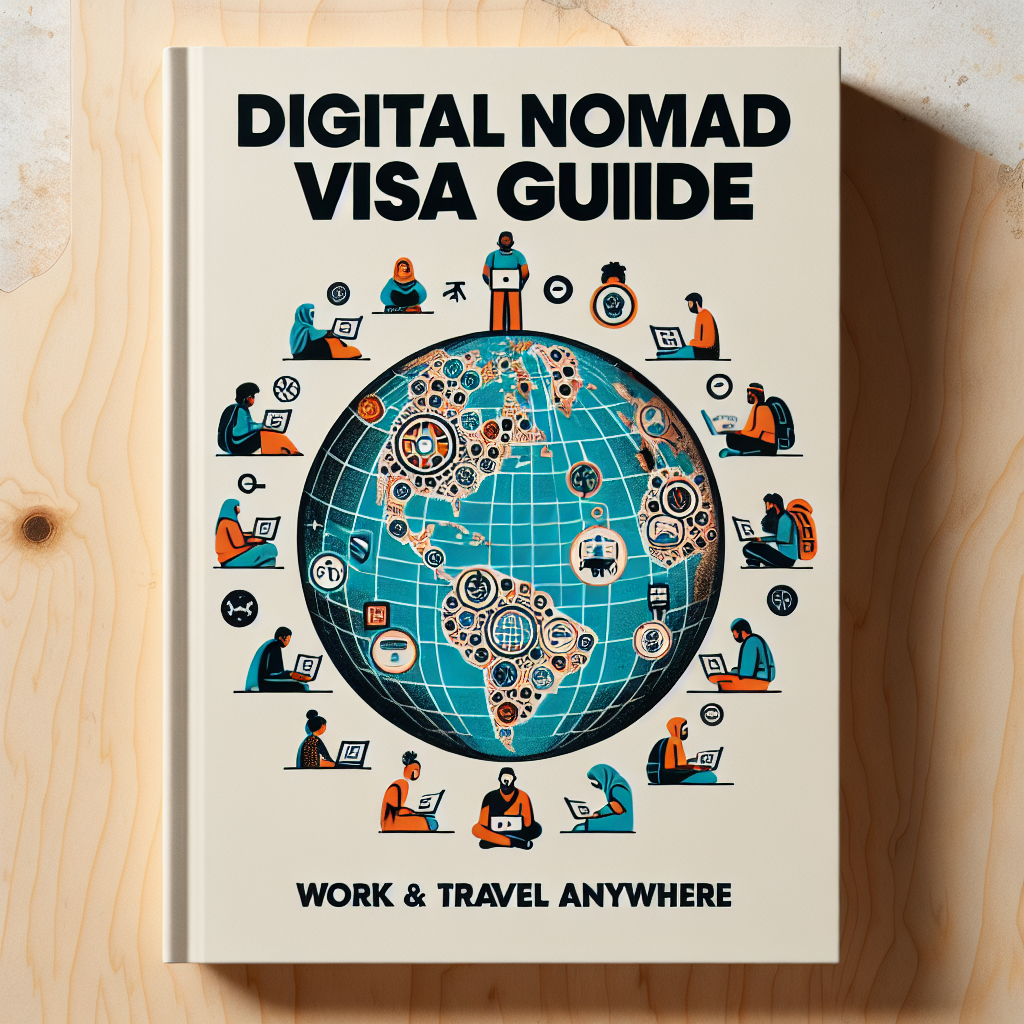2025 Digital Nomad Visa Guide: Work & Travel Anywhere

Unlock the World: Your Ultimate Guide to the Digital Nomad Visa
In an era where 'work from anywhere' has transcended buzzword status to become a global movement, the digital nomad visa emerges as the golden key to a life of adventure and professional freedom. As more countries around the globe roll out the red carpet for remote workers, the possibility of exploring new cultures while ticking off your to-do list is not just a dream—it's an attainable lifestyle.
Embarking on the Digital Nomad Journey: What You Need to Know
Before you trade in your office key for a passport, understanding the nuances of the digital nomad visa is crucial. From navigating the intricate web of digital nomad taxes to pinpointing the perfect coworking space, this comprehensive guide is designed to provide you with a step-by-step tutorial on how to seamlessly transition into your new remote-working life.
The A-Z of Digital Nomad Visas: Eligibility, Application, and Beyond
Embarking on your digital nomad adventure begins with knowing which doors are open to you. We'll walk you through the eligibility criteria of various digital nomad visas, demystify the application process, and help you comprehend the legalities that come with international remote work. Whether you're a freelancer, entrepreneur, or full-time employee with a case of wanderlust, our guide ensures that you're well-informed and ready to take the plunge.
Navigating Taxes as a Global Remote Worker
One of the most daunting aspects of living as a digital nomad is understanding and fulfilling your tax obligations. Our guide breaks down the complexities of digital nomad taxes, offering clear explanations and actionable advice to keep you in good standing with tax authorities, no matter where your travels may lead.
Discovering Your Ideal Workspace: Coworking Spaces Reviewed
The beauty of being a digital nomad is finding inspiration in the most unexpected places. However, reliable Wi-Fi and a conducive work environment are non-negotiable. That's why we've scoured the globe and reviewed coworking spaces that not only offer essential amenities but also foster community and productivity. Join us as we dive into the world of digital nomad visas, ensuring that your transition to a location-independent lifestyle is as smooth and stress-free as possible. Whether you're taking the first step or looking to refine your nomadic experience, this guide is your go-to resource for a life without borders.
Digital Nomad Visa: An Overview
In the rapidly evolving landscape of remote work, the concept of a digital nomad visa has become increasingly popular. This type of visa is specifically designed for individuals who work online and wish to live in a foreign country for an extended period, beyond what a typical tourist visa allows. As we move into 2025, various countries are catching up with this trend, offering digital nomad visas to attract remote workers who contribute to the local economy without displacing local jobs.
Understanding the 2025 Digital Nomad Visa
The 2025 digital nomad visa is a testament to the changing work environment, where physical presence in a traditional office is no longer a necessity for many professionals. Countries offering such visas have recognized the potential economic benefits of welcoming remote workers. These visas often provide legal permission to reside in the host country for a duration that ranges from a few months to a couple of years, with the possibility of renewal. Some of the requirements for obtaining a digital nomad visa typically include proof of steady income, health insurance, and a clean criminal record. Applicants must also demonstrate that their employment is location-independent, often by showing contracts or letters from employers or clients that verify their remote working arrangements.
Case Studies: Success Stories of Digital Nomad Visas
One notable example of a successful 2025 digital nomad visa program is Estonia's. Launched earlier, Estonia's digital nomad visa allows remote workers to live in the country while continuing to work for a foreign employer or as a freelancer. The program has attracted a diverse group of professionals, enriching the local cultural landscape and fostering international connections. Another case study is the Caribbean island of Barbados, which introduced the "Barbados Welcome Stamp" in response to the pandemic. This visa allows digital nomads to live and work on the island for typically 6-12 months. The program's success has not only injected money into the economy through local spending but also increased the island's visibility as a prime location for remote work.
Finding a Cheap Digital Nomad Visa in 2025
Cost can be a significant factor for digital nomads when choosing a destination. Some countries offer cheap digital nomad visas as a way to attract remote workers on a budget. Countries like Georgia, with its "Georgia's digital nomad program" program, offer affordable living costs and a simple visa process, making it an attractive destination for cost-conscious nomads. Other countries with competitively priced digital nomad visas include Portugal and Mexico. These countries not only offer reasonable visa fees but also provide an affordable cost of living, which is an essential consideration for many digital nomads.
Current Trends and Future Insights
The concept of a digital nomad visa has become increasingly popular as the workforce shifts towards a more remote, flexible structure. According to McKinsey's Future of Work research, governments around the world have started to recognize the economic benefits that digital nomads can bring to their countries. Current trends show that digital nomad visas are becoming more accessible and diverse in their offerings. Countries are competing to provide the most attractive packages, including tax benefits, extended stays, and support services. Nations like Estonia, Barbados, and Georgia were among the first to introduce such visas, and they have paved the way for others to follow. Insights from TechCrunch's remote work coverage suggest that the demand for digital nomad visas is not only driven by individual workers but also by companies looking to support their employees in adopting a nomadic lifestyle. This trend is further bolstered by the post-pandemic shift in work habits, with many employees reluctant to return to the traditional office environment. The digital nomad visa also reflects a broader trend in immigration policy, one that recognizes the value of temporary residents who contribute economically without necessarily seeking permanent residency. Countries are starting to craft immigration policies that are flexible and adaptive to the changing nature of work. Research by Prithwiraj Choudhury, Harvard Business School Professor, indicates:
🌍 Top Digital Nomad Visa Countries 2025
Interactive ranking with real-time filters
EU Citizens: No Visa Needed!
Work remotely from any EU country for up to 90 days without a visa.
🇪🇪 Deep Dive: Estonia #1 Ranked
Estonia ranked #1 in our comparison. Get the complete story with real experiences, tax savings calculator, and step-by-step application guide.
📖 Read Complete Estonia Guide →— Prithwiraj Choudhury, Harvard Business School Professor
The trend towards digital nomad visas is also seen as a response to the growing importance of work-life balance, with many remote workers seeking to explore the world without sacrificing their careers. As the trend continues to grow, we can expect to see further innovation in visa offerings, including partnerships between countries and even the possibility of multi-country visas that allow for even greater mobility among digital nomads.
Digital Nomad Visa FAQ: Essential Questions Answered
What is a Digital Nomad Visa and Who is Eligible for It?
A Digital Nomad Visa is a type of visa designed for remote workers and freelancers who want to live and work in a foreign country without being tied to a local employer. Eligibility criteria often include proof of sustained income, health insurance, and a clean criminal record. For comprehensive guidance on professional development while working remotely, Harvard Business Review's self-management resources provide valuable insights.
How Do I Apply for a Digital Nomad Visa?
The application process varies depending on the country but typically involves submitting an application form, financial documents, and a valid passport. Some countries may also require an interview. Each destination has specific requirements that should be researched thoroughly before applying.
Which Countries Offer a Digital Nomad Visa?
Several countries offer Digital Nomad Visas, including Estonia, Barbados, Croatia, Portugal, and many others. Each country has its own set of rules and benefits. The landscape is constantly evolving as more nations recognize the economic benefits of attracting remote workers.
What Are the Financial Requirements for a Digital Nomad Visa?
Financial requirements often include proving a stable income that meets or exceeds a specified minimum threshold, and sometimes evidence of savings. The exact figures vary by country, typically ranging from $2,500 to $6,000 per month in demonstrated income.
Can I Bring My Family with a Digital Nomad Visa?
Some Digital Nomad Visas allow the holder to bring dependents, such as a spouse or children. However, additional documentation and fees may apply. Family inclusion policies vary significantly between countries and should be verified with the specific destination's immigration requirements.
How Long Can I Stay in a Country with a Digital Nomad Visa?
The length of stay permitted by a Digital Nomad Visa varies by country, typically ranging from a few months to a few years, and may be renewable. Estonia offers typically 6-12 months, while some programs allow for multi-year stays with renewal options.
What Happens if I Overstay My Digital Nomad Visa?
Overstaying a Digital Nomad Visa can lead to penalties, fines, deportation, and potential bans from re-entering the country. It's important to understand the consequences and maintain proper legal status throughout your stay.
Are There Tax Implications with a Digital Nomad Visa?
Yes, there can be tax implications when living and working in a foreign country with a Digital Nomad Visa. Each country has its own tax laws for foreign workers. For detailed financial planning guidance, Forbes Advisor provides comprehensive resources on international tax considerations and financial management for remote workers.
📋 Step-by-Step Application Guide
Your roadmap to securing a digital nomad visa
🎯 Choose Your Destination
Use our interactive country ranking above to find the perfect match for your budget and preferences.
📄 Gather Required Documents
🏛️ Universal Requirements:
- Valid passport (6+ months)
- Proof of income/employment
- Health insurance coverage
- Clean criminal record
💼 Work-Related Docs:
- Employment contract/letter
- Bank statements (3-6 months)
- Tax returns (if self-employed)
- Portfolio/business proof
🌐 Submit Application Online
Most digital nomad visas are applied for online. Here are the official portals:
⏳ Track & Wait for Approval
Processing times vary by country. Use this time to prepare for your move:
✈️ Arrive & Register
Once approved, you're ready to start your digital nomad journey!
🎉 First 30 Days Checklist:
- Register with local authorities (if required)
- Set up local phone number & internet
- Find healthcare providers
- Open local bank account (optional)
- Join professional & social communities
Ready to Start Your Application?
Use our country ranking tool above to find your perfect destination first!
Conclusion: Your Journey Begins Now
In conclusion, the digital nomad visa represents an innovative shift in the global workforce and lifestyle dynamics, catering to those who seek to merge travel with their professional lives. Throughout this guide, we have unpacked the various facets of digital nomad visas, from eligibility criteria and application processes to the benefits and challenges of such an arrangement. As budding or established digital nomads, it is crucial to weigh the legal, financial, and personal implications of relocating under a digital nomad visa. Prospective nomads should ensure they have a stable income source that complies with the visa requirements of their chosen country and consider the impact of tax obligations and health care coverage abroad. An actionable next step would be to create a shortlist of preferred destinations, aligning them with your personal and professional goals. Then, delve deeper into the specifics of each location's digital nomad visa, reaching out to local embassies or consulting with immigration experts if necessary. Additionally, joining digital nomad communities can provide invaluable insights and support as you navigate this lifestyle transition. Remember to keep abreast of the ever-evolving policies and regulations surrounding digital nomad visas, as countries continue to adapt to the growing trend of remote work. Understanding the nuances of these changes will be paramount in maintaining legal status and making the most out of the digital nomad experience.
— Prithwiraj Choudhury, Harvard Business School Professor
By approaching the digital nomad lifestyle with careful planning and a proactive mindset, individuals can transform their work and life into a harmonious blend of productivity and adventure. Whether you are just starting or looking to refine your nomadic lifestyle, the world awaits with open arms and endless possibilities for those willing to take the leap.



